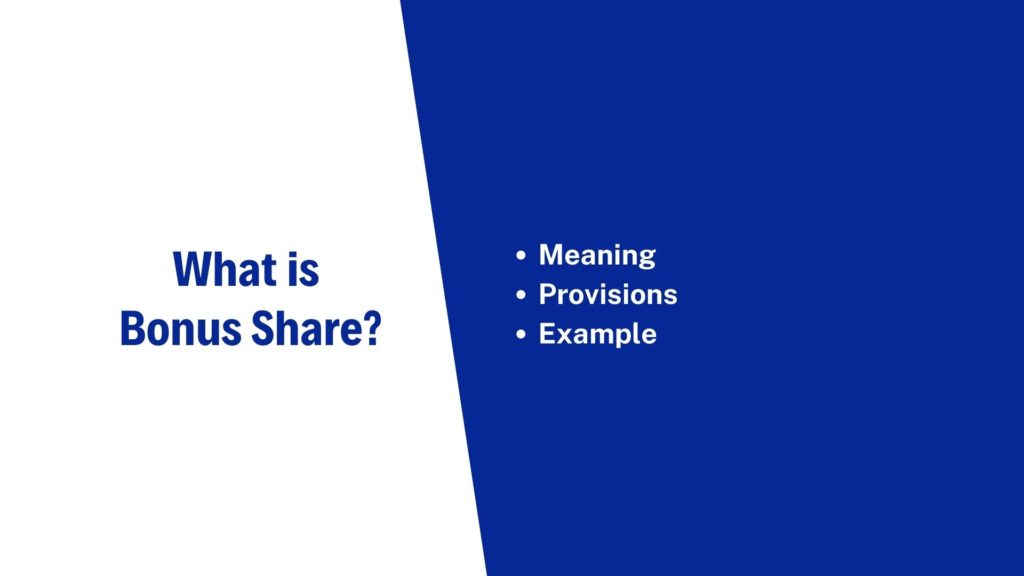What is Bonus Share? – Free Educational Articles on Scholarszilla
Table of Contents
What is Bonus Share?

Definition
Bonus shares are fully paid shares issued free of cost to the existing equity shareholders in proportion to their shareholdings. Usually, financially sound companies issue Bonus Shares out of their accumulated distributable profits or reserves. Hence as the profits or reserves are capitalized, it is also called as ‘Capitalisation of Profits or Reserves’.
Provisions
The following are the provisions related to Bonus Issue:
a) A company can issue Bonus Shares only out of :
i) Free reserves or
ii) Securities Premium Account or
iii) Capital Redemption Reserve Account
Securities Premium Account is an account in which the premium amount collected when shares are sold at premium is kept.
Capital Redemption Reserve Account is an account in which a company transfers part of its profits to be used for specific purposes. e.g. Issue Bonus Shares.
b) A company cannot issue bonus shares only out of reserves created by the Revaluation of Assets.
Revaluation of Assets : Value of assets recalculated to find out the current value of assets.
c) It also cannot issue Bonus Shares instead of paying dividends.
d) Once the announcement for Bonus Shares is made by the Board of Directors, it cannot be then withdrawn.
e) Bonus shares are fully paid up shares.
f) Shareholders cannot renounce i.e. give away their Bonus shares to another person.
g) There is no minimum subscription to be collected.
Record Date
Bonus shares are usually announced by the company with a record date, the date which is considered for the bonus shares. All the investors holding the shares on the record date are eligible for bonus shares. After the announcement of the bonus but before the record date, the shares are referred to as cum-bonus. After the record date, when the bonus has been given effect, the shares become ex-bonus.
Example of Issue of Bonus Shares
When a company offers 1:5 bonus shares, it means a shareholder will get 1 free share for 5 shares. So if an investor holds 100 shares at the time of bonus then they will become 120 shares.
Why do Companies Declare Bonus Shares?
Companies issue bonus shares to encourage retail participation and increase their equity base. When the price per share of a company is high, it becomes difficult for new investors to buy shares of that particular company. An increase in the number of shares reduces the price per share. But the overall capital remains the same even if bonus shares are declared. Company usually gives bonus shares as a substitute for dividend payouts.
What are the Effects of a Bonus Issue?
Bonus shares do not directly affect a company’s performance. Bonus issue has following major effects:
- Share capital gets increased according to the bonus issue ratio.
- Liquidity in the stock increases.
- Effective Earnings per share, Book Value and other per share values stand reduced.
- Markets take the action usually as a favorable act.
- Accumulated profits get reduced.
- A bonus issue is taken as a sign of the good health of the company.
Will the Share Price Change after Bonus Issue?
A bonus issue adds to the total number of shares in the market leads to a dilution in equity. The earnings of the company will have to be divided by that many more shares.(Earnings Per Share = Net Profit/Number of Shares) Since the profits remain the same but the number of shares has increased, the EPS will decline.
Theoretically, When EPS declines, the stock price should also decrease proportionately.
But, in reality, it may not happen due to the following reasons:
a) The stock is now more liquid. Now that there are so many more shares, it is easier to buy and sell.
b) A bonus issue is a signal that the company is in a position to service its larger equity. What it means is that the management would not have given these shares if it was not confident of being able to increase its profits and distribute dividends on all these shares in the future.


